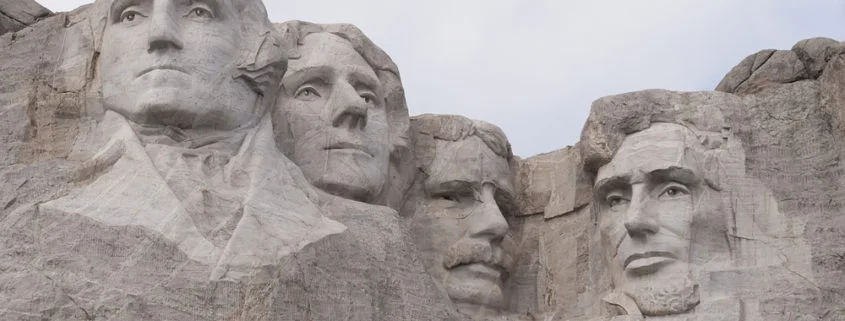The History Of George Washington
This coming Monday, February 20, is Presidents’ Day. As a tribute to our very first president of the United States, we’d like to delve into the history of George Washington. Presidents’ Day is an American holiday celebrated on the third Monday in February. This holiday was originally established in 1885 in recognition of our first U.S. President — George Washington. In fact, this day is still officially called “Washington’s Birthday” by the federal government, according to history.com.
George Washington Pre-Presidency
George Washington was born on February 22, 1732, on his father’s plantation in Virginia. He was the commander of the Continental Army, president of the Constitutional Convention, and gentleman planter. Washington played a big role in the French and Indian war and then in June of 1775, Congress commissioned Washington to take command of the Continental Army besieging the British in Boston. The command kept him away from his family in Mount Vernon for more than 8 years. George Washington felt unprepared for what was ahead with this command. During this time, Washington’s troops crossed the Delaware and attacked garrison at Renton, forcing it to surrender. Washington again crossed the Delaware a few days later, outmaneuvered the force sent to crush him, and fell on the enemy at Princeton, inflicting a humiliating loss on the British. Washington made bold plans for the Battle of Yorktown, which was on an even larger scale than Trenton and Princeton. Washington marched south to lay siege on Cornwallis. October of 1781 is when he accepted the surrender of Cornwallis’s army. Two years later, the peace treaty was completed and the victory at Yorktown effectively ended the Revolutionary War. Washington’s victory over the British went down as one of the most historic victories in U.S. history.
The Constitutional Convention
Although Washington resigned his commission from the revolutionary war on December 23, 1783, essentially making him an international hero for giving up power when he could have been crowned a king, the affairs of the nation continued to command his attention. “He watched with mounting dismay at the weak union created by the Articles of Confederation gradually disintegrated, unable to collect revenue or pay its debts. He was appalled by the excesses of the state legislatures and frustrated by the diplomatic, financial, and military impotence of the Confederation Congress.” By 1785, Washington had concluded that reform was necessary for the goodwill of the nation. He told James Madison that an energetic constitution was needed.
Washington played a big role in ratifying the Constitution. This was one of his biggest struggles but he never gave up. Even in Washington’s home state of Virginia, the Constitution was ratified by a majority of only one vote.
Once the ratified Constitution was approved, Washington hoped to retire from his political involvement and return to private life. His wishes were not granted when he was unanimously selected to be President from every elector. To this day, he is the only U.S President to be selected by a unanimous vote of the people.
George Washington’s Presidency
George Washington served as our first American President for two terms. His first term, which was from 1789-1793 consisted mostly of organizing the executive branch of the new government and establishing administrative procedures that would bring energy and efficiency to the republic’s future.
Washington appointed his former aide-de-camp, Alexander Hamilton, as Secretary of the Treasury; Thomas Jefferson as Secretary of State; and his former chief, Henry Knox, as secretary of war. James Madison was one of his principal advisors. All of these men played a significant role in our political and U.S. history.
George Washington went down as one of the most able administrators ever to serve as president as well as the most humble and fair president of the U.S. Those who knew him labeled him as a man of integrity and honor. He conveyed to his people that the President “could exercise extensive executive authority without corruption.” Thomas Jefferson wrote that Washington’s integrity was the most pure and his justice the most inflexible. “No motive of interest or consanguinity, friendship, or hatred, being able to bias his decision,” Jefferson wrote.
Washington contributed heavily to the debt crisis during his term as president, concluded peace treaties with Southeastern Indian tribes, and designated a site on the Potomac River for the permanent capital of the United States. As his first term ended, a bloody Indian war continued on the northwestern frontier. Washington planned to step down after his first term but his cabinet members convinced him otherwise. He then served for a second term.
Washington’s Second Term (1793-1797)
His second term was dominated by foreign affairs and complications rose by a deepening partisanship in his own administration. Washington was President during the French Revolution, a time of international crisis and turmoil. The outbreak of the genial European war in 1793 forced the crisis to the center of American politics. Washington believed that national interest of the U.S. dictated neutrality.
One of Washington’s most important accomplishments was keeping the U.S. out of the war, giving the new nation an opportunity to grow in strength while establishing the principle of neutrality that shaped American foreign policy for more than a century. Although Washington’s department heads agreed that the United States should remain neutral, disagreements over foreign policy aggravated partisan tensions among them. The disagreements were part of the deepening division between Federalists and Republicans.
The opposition to federal policies developed resistance to the law in 1794 as distillers in Western Pennsylvania rioted and refused to pay taxes. Washington directed the army to restore order, a step applauded by Federalists and condemned by Republicans.
Washington achieved a lot during his presidency and was well-respected by the people. Like any presidency, some events were easier to get through than others but he had a vast amount of important achievements. The long Indian war on the northwest frontier was won, Britain surrendered its forts in the northwest, and Spain opened the Mississippi to American commerce. These achievements opened the West to settlement. Washington’s Farewell address helped to summarize many of Washington’s strongest beliefs about what it would take to sustain and grow the young nation that he helped found.
Used for this article: mountvernon.org, history.com












